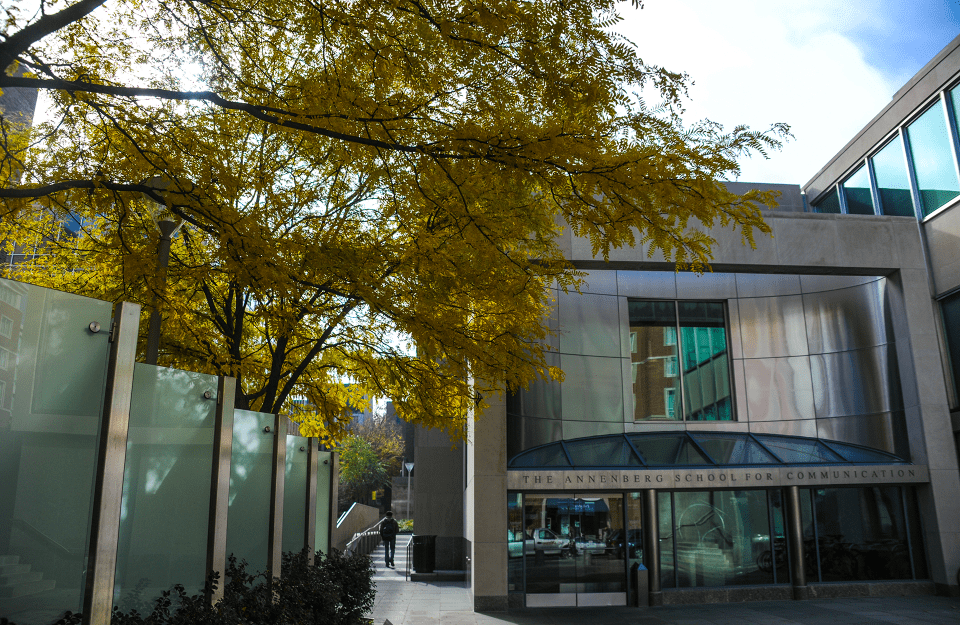Annenberg Scholars Program in Culture and Communication Welcomes Des Freedman and E. Patrick Johnson
Freedman studies media policy, and Johnson is interested in black, feminist, and sexuality studies.

Be the media. Know the media. Change the media.
This slogan, used by the Media Democracy Project in Canada, is how Des Freedman, Professor of Media and Communication Studies at Goldsmiths, University of London, frames his intellectual journey. It’s a thread that connects both of this semester’s Scholars Program in Culture and Communication visiting scholars, Freedman and E. Patrick Johnson, the Carlos Montezuma Professor of African American Studies and Performance Studies at Northwestern University.
The Scholars Program, directed by Professor Barbie Zelizer, recently hosted an introductory colloquium during which Freedman and Johnson introduced themselves and their work to the Annenberg community.
Freedman’s first job was as an “office boy” for a magazine, and he later worked as a journalist. This front row seat to the media industry led him to pursue advanced degrees in Media Policy Studies in an effort to better understand the field. He now seeks to contribute to the discussion about media policy in a way that will effect change in the UK and the world.
Freedman’s research is focused on the relationship between media and power, coupled with the political and economic contexts of media policymaking, regulation, and reform. Recently, he has been interested in the British phone hacking crisis and the future of the BBC.
Freedman is a founding member and recent chair of the Media Reform Coalition, which collaborates with groups and individuals to produce research and to organize campaigns aimed at creating a media system that operates in the public interest. His work with the Media Reform Coalition has been incorporated into the British high school curriculum.
He is the author or co-author of ten books, including Misunderstanding the Internet (Routledge 2016), The Contradictions of Media Power (Bloomsbury 2014), and The Politics of Media Policy (Polity 2008).
This semester, Freedman will teach a graduate course at Annenberg entitled “Revolting Media: Communication and Social Change.” The course will celebrate the role of media in historical revolts and consider the work of key theorists, eventually considering recent debates concerning the revolt against the media itself. On October 3, he will give a public lecture on British and American news media, discussing whether the public service model is really better than the commercial, partisan model.
Like Freedman, Johnson also began his career by “being the media.” He was drawn to stage acting and began his academic journey as an undergraduate theater major. Intrigued by questions of how to evaluate performance, he pursued advanced degrees in performance studies. As an academic and an administrator, he seeks to change the way performance represents people and the way performance is evaluated within academia.
Johnson is the chair of Northwestern’s African American Studies department and the founder and director of its Black Arts Initiative, which aims to cultivate an interdisciplinary approach to black arts through research, pedagogy, practice, and civic and community engagement.
Johnson is interested in black, gender, and sexuality studies, performance studies, ethnography, oral history, and spirituality. His co-edited volume Black Queer Studies (Duke University Press 2005) is considered the premiere text on the origins of black queer theory, and he is the author of two award-winning books, Appropriating Blackness: Performance and the Politics of Authenticity (Duke University Press 2003) and Sweet Tea: Black Gay Men of the South—An Oral History (UNC Press 2011).
In addition, he is currently involved in a documentary project with Penn School of Social Policy and Practice Dean and Annenberg Professor John L. Jackson, Jr. The documentary focuses on the men who shared their stories with Johnson for his book Sweet Tea. It also showcases Johnson’s performances of the oral histories that make up Sweet Tea, including the times he performed for the very same men whose stories constitute the performances. It is a collaboration that began as Jackson saw Johnson’s performance tour at the Annenberg Center at Penn in 2007.
While at Annenberg, Johnson will teach a course entitled “Black Feminist/Black Queer Theory,” in which he will discuss topics like the legacy of slavery, activism, work, family, self-esteem, and body politics. He gave a public lecture on September 12, during which he discussed his current project chronicling black Southern women who love women.
For more information about the Scholars Program in Culture and Communication, please contact Emily Plowman.



